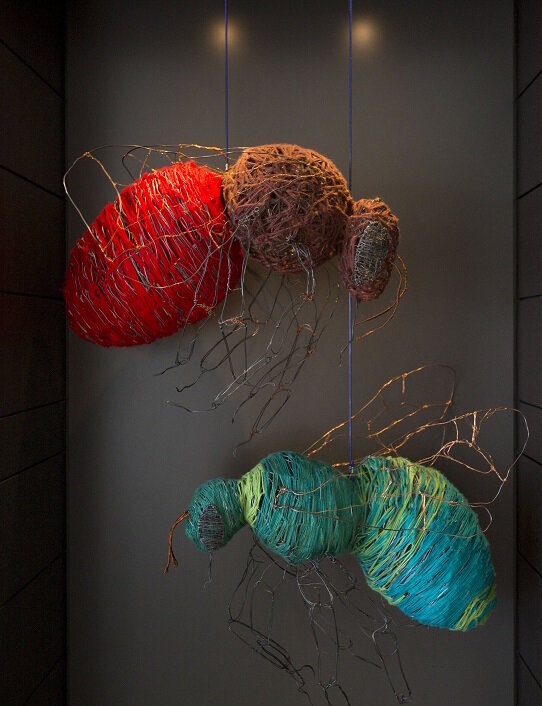WIld Bees
Cuckoo Bee, 2014, mixed wire with red and brown wool, 29”x16”x13”
“Lurch’s beautiful giant wire bees insist on the connections among metal, mechanical loads, pollination, environmental decline, flight, and Black ecologies” - Katherine McKittrick, Artforum, 2020
Wild Bees, 2012 - ongoing, mixed wire, wool, yarn, varying sizes
Shown at Artscape Daniels Spectrum, Nuit Blanche, Riverbrink Museum as well as many other public and private gallery collections.
Informed by an interest in ecology, Charmaine Lurch brings a thoughtful and focused attention to the complexity of the natural world and the interactions of humans within it. Bees are critical to our survival, but they are often invisible to us. These large-scale wild bee sculptures magnify the size or these animals and also call attention to and remind of our human/animal relationships. The shadows cast by wire forms, create a physical extension, a subtle doubling that is easily disrupted, evoking the fragility of nature.
Inspired by the work of bee biologist Laurence Packer, Lurch’s investigations and explorations marry art with science. Distinctive features of the bees, such as the jewel green sweat bee and the leafcutter bee are rendered with brilliantly coloured wire and wool thread. These colours based on the actual colours of wild bees and reveal the tremendous variety of the pollinators that surround us.
“Lurch's interest in bees was fed by renowned melittologist Laurence Packer, author of Keeping the Bees, who supplies the bee specimens she models her sculptures on. When Lurch describes her bees, I'm caught up in the singularities she attributes to each one: their colours, their various proportions, their unkempt outlines. The bees are scaled up at around two feet long. Each bee is an individual, with varying colours and proportions, and different species are represented. Looking at them, I learn their names: cuckoo bees, mining bees, leafcutter bees, sweat bees. I also find out that only the female worker bees have stingers, which they keep out of sight — giving new meaning to this gendered kamikaze weaponry.” - Nehal El-Hadi, CBC


















